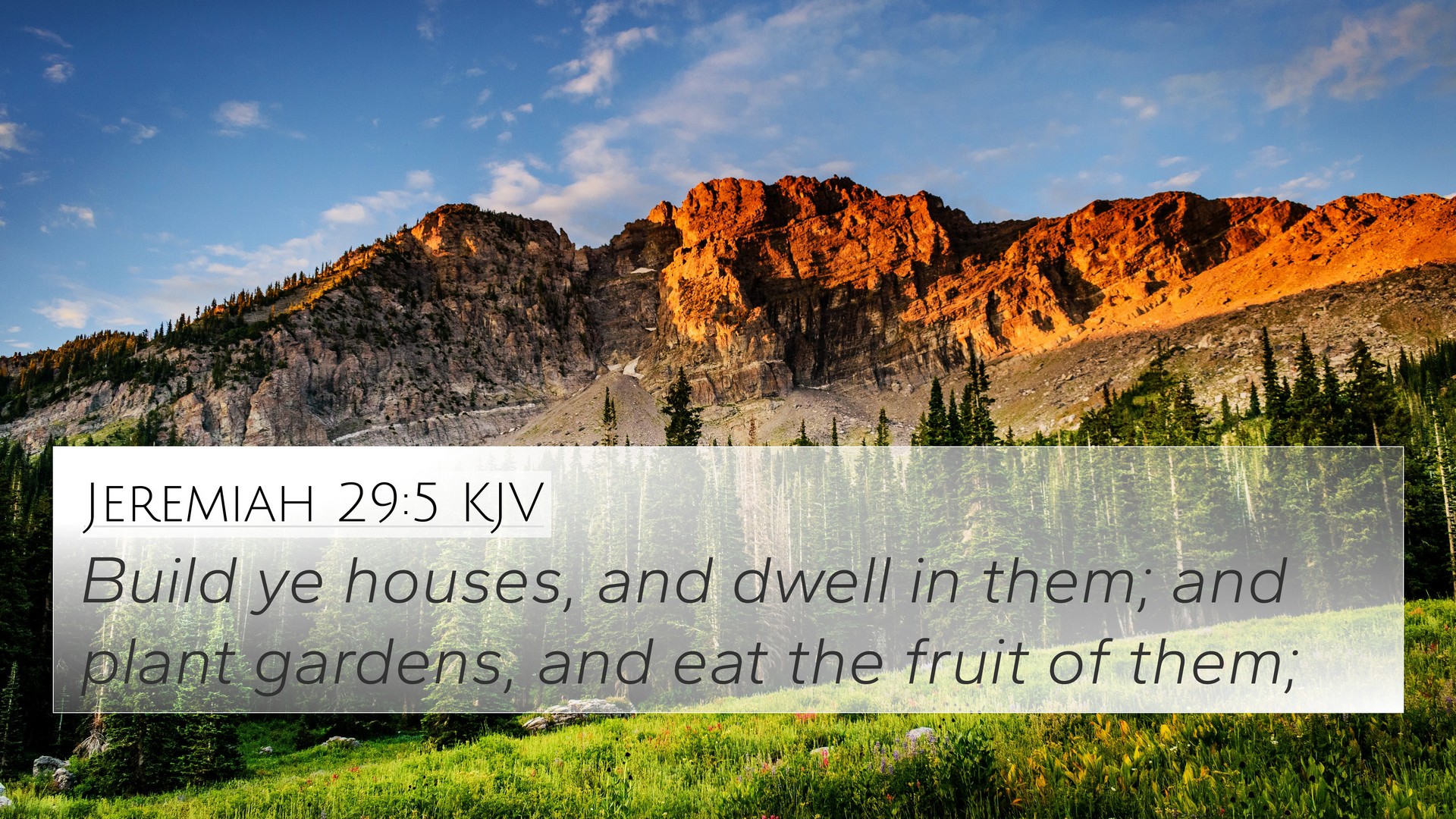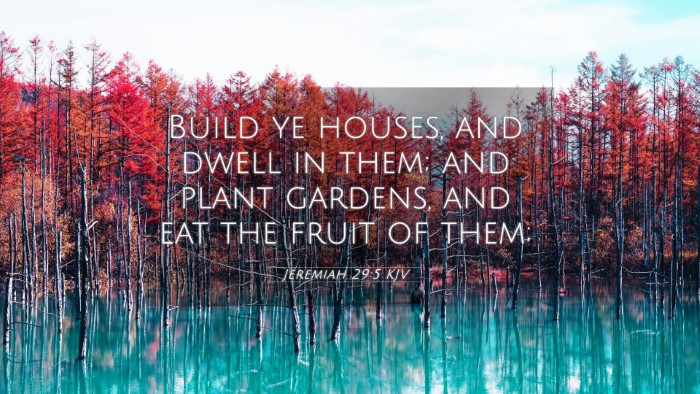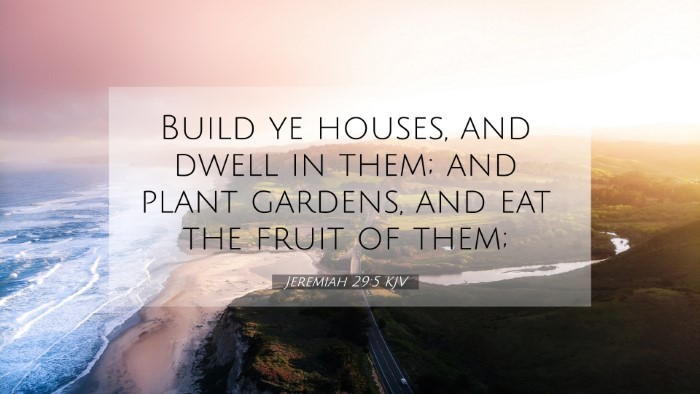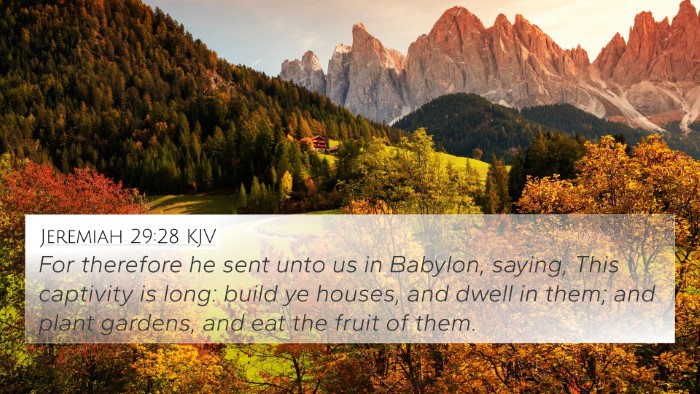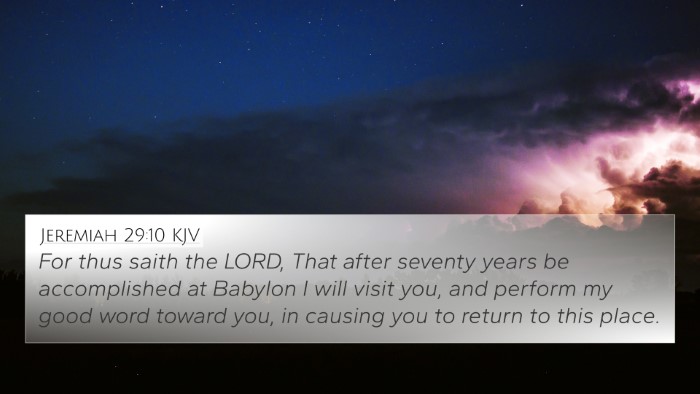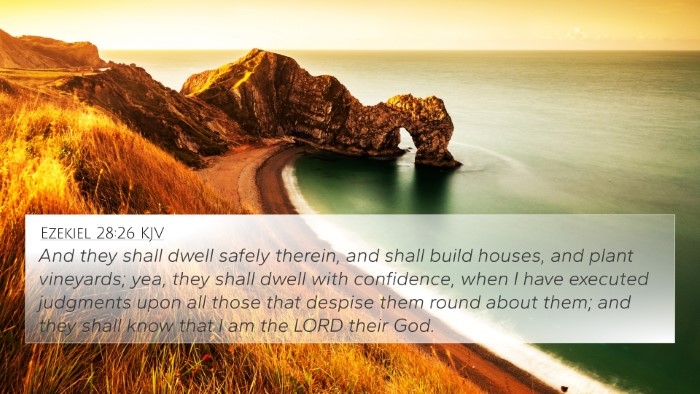Understanding Jeremiah 29:5
Jeremiah 29:5 states: "Build ye houses, and dwell in them; and plant gardens, and eat the fruit of them." This directive, given to the captives of Babylon, carries profound implications for their identity, purpose, and faith.
Contextual Significance
The context of this verse is essential for understanding its meaning. The people of Israel were in exile, having lost their homeland. This situation raised immense challenges related to their identity and faith. Yet, Jeremiah's message is one of hope and resilience.
Commentary Insights
- Matthew Henry: He emphasizes the importance of actively engaging in life despite difficult circumstances. The instruction to "build" and "plant" illustrates that while the Israelites were in captivity, they were still encouraged to live fully and faithfully. They should not merely wait for God to act but should participate in the life He had provided.
- Albert Barnes: Barnes highlights the importance of establishing a new life even in exile. The call to build houses and gardens signifies a commitment to the long term. This reflects a theological underpinning that God's presence can be found even outside the Holy Land, signifying that they are not abandoned.
- Adam Clarke: Clarke discusses the transformational aspect of this command. The imagery of planting indicates hope and future growth, urging the exiles to see their time in Babylon not merely as a punishment but as an opportunity for new beginnings.
Thematic Connections
Jeremiah 29:5 can be functionally linked to various other Bible verses, creating a rich tapestry of thematic connections:
- Isaiah 55:10-11: This passage speaks of God’s word accomplishing its purpose, paralleling the idea of intentional planning and growth.
- Psalm 137:1-4: The lament of the exiles contrasts with Jeremiah's hopeful message, highlighting the emotional struggle while still calling for active engagement.
- 1 Peter 2:11-12: Peter encourages believers as exiles to live honorable lives among the Gentiles, reflecting an ongoing theme of residing amid foreign lands while maintaining Godly witness.
- Matthew 5:14-16: Jesus teaches about being the light in the world, suggesting that believers should actively contribute to their environments, similar to Jeremiah's encouragement.
- Proverbs 16:3: This verse advises committing one’s works to the Lord, resonating with the idea that building houses and planting gardens should be done with God's glory in mind.
- Jeremiah 29:7: Following this verse, Jeremiah urges the captives to seek the welfare of the city, illustrating the theme of community responsibility.
- Hebrews 11:9-10: Emphasizing the idea of living as strangers and pilgrims, this verse aligns with the concept of establishing oneself even amidst a temporary situation.
- Acts 17:26-27: Paul speaks of God determining places and times, reminding us of divine sovereignty in our locations, like the exiles in Babylon.
- Philippians 4:19: The reassurance that God will supply every need connects to the exiles’ plight, asserting God’s provision even amidst trials.
- Colossians 3:23: This encourages doing work heartily as for the Lord, resonating with the essence of purposeful living in captivity.
Practical Applications
Applying Jeremiah 29:5 involves understanding our current situations through a lens of hopeful resilience, actively participating in life, and trusting God's provisions even in challenging circumstances. Here are ways to practically apply this verse:
- Engage with your community: Look for ways to contribute and build relationships within your current context, just as the exiles were encouraged to do.
- Plan for the future: Establish long-term goals in your spiritual and personal life, recognizing that God’s plans often unfold over time.
- Embrace gratitude: No matter the challenges faced, cultivating a heart of thankfulness can shift perspective and promote growth.
- Trust in God's provision: Recognize that even in difficult circumstances, God is at work, providing opportunities for growth and enrichment.
SEO Keywords and Themes
In exploring Jeremiah 29:5, we recognize various primary and secondary keywords relevant to this verse:
- Bible verse cross-references
- Connections between Bible verses
- Linking Bible scriptures
- Comparative Bible verse analysis
- Bible verses that relate to each other
- Cross-referencing Biblical texts
- Thematic Bible verse connections
- Bible verse parallels
- Scriptural cross-referencing
- Inter-Biblical dialogue
By examining these connections and utilizing tools for Bible cross-referencing, one can deepen understanding of Jeremiah 29:5 and its implications. Resources such as a Bible concordance and cross-reference Bible study guide may prove invaluable in this pursuit.
